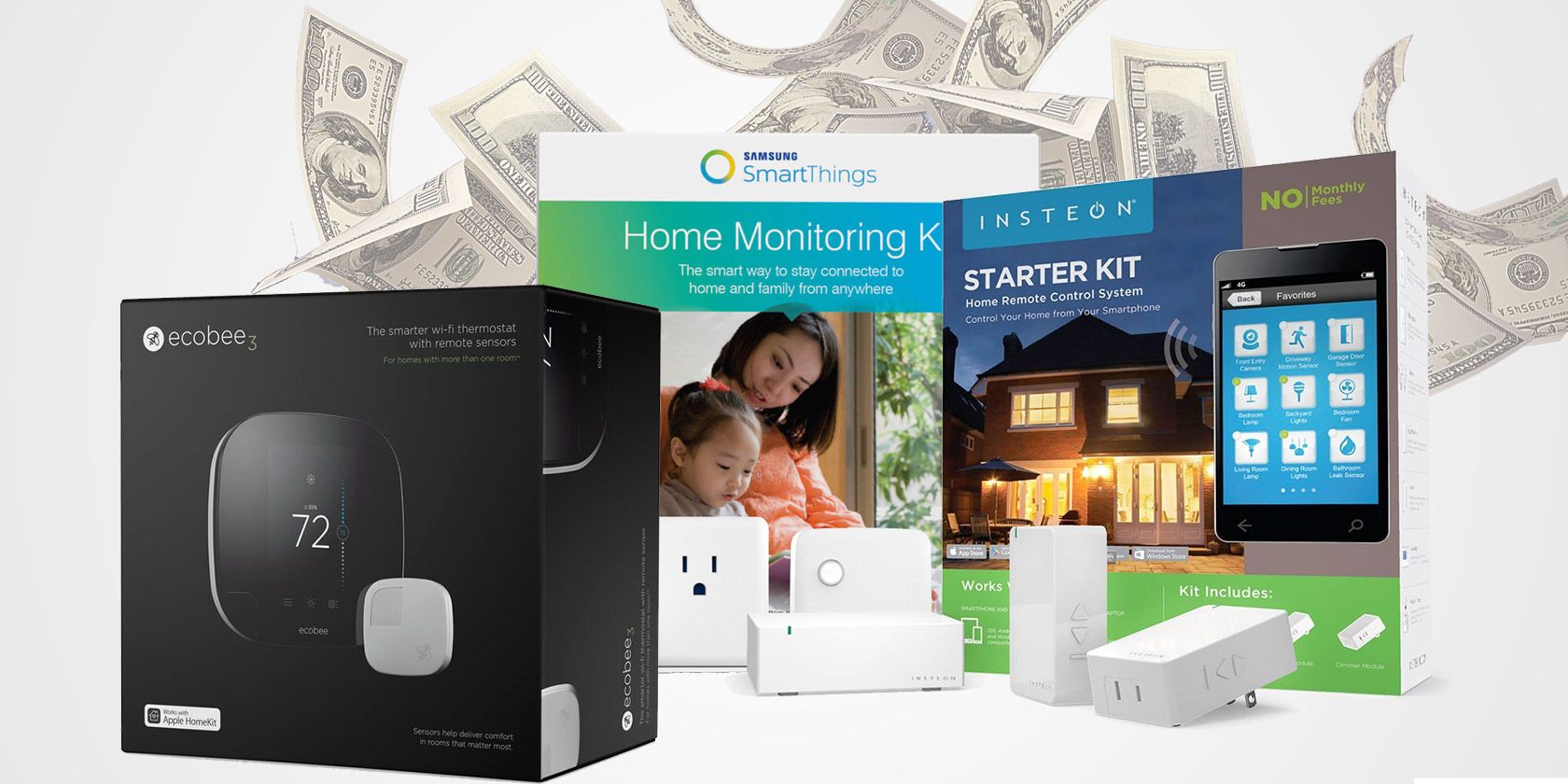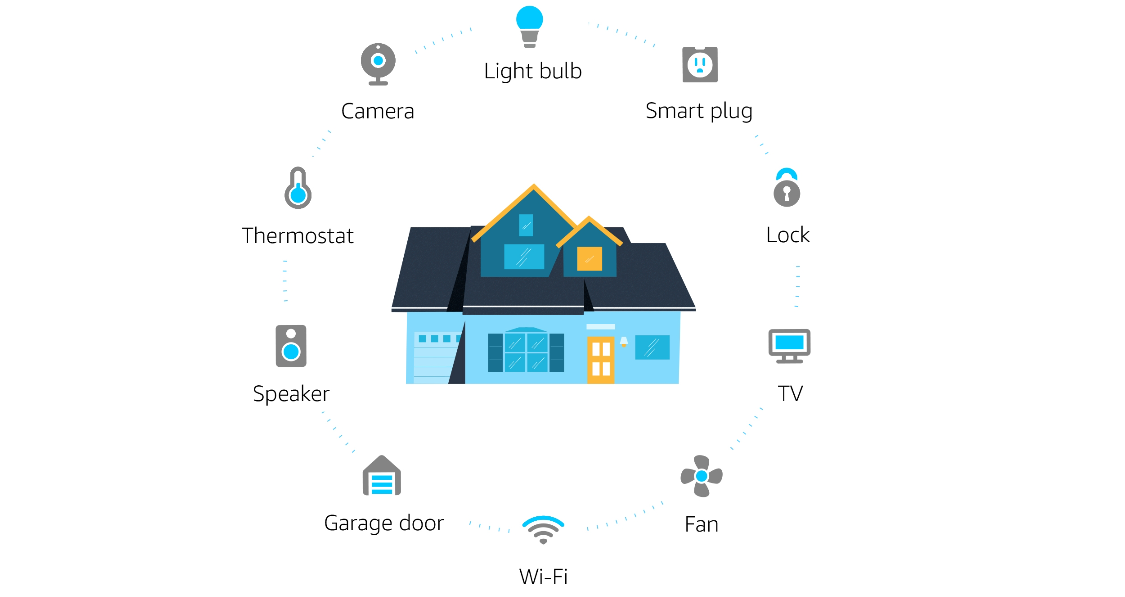Should You Buy a Smart Home Starter Kit?
If you're interested in creating a smart home, one of the things you might find yourself considering is the use of an all-in-one smart home starter kit. For the most part, simplicity and ease of use are the two guiding principles of these kits.
Often they contain a smart home hub and several standard accessories. But do these kits offer any significant advantages over building a smart home piece by piece? We'll help you decide if one of these kits is right for you.
What Is a Smart Home Starter Kit?

A smart home starter kit is a bundle of common accessories sold as a package. The most popular kit is probably the LED smart bulb starter kit from Philips Hue. This kit includes a set of four LED bulbs and the Philips Hue hub.
Ideally, you plug your hub into your router, download an app, and then install and configure your bulbs. It's relatively simple and takes hardly any time.
But, starter kits don't always have to include only one type of product. Some, like the Aqara Smart Starter Kit, offer a hub as well as a window/door sensor, a motion sensor, and a smart plug.
What Are the Benefits of Buying a Smart Home Starter Kit?

Cost and convenience are the main benefits of buying a starter kit. Because the sheer scope of smart home products and manufacturers is often overwhelming for beginners, these kits take a lot of the guesswork out of smart home design.
Instead of meticulously researching and configuring each device, you can just buy a kit with devices from one manufacturer that is plug-and-play. By purchasing a kit, you'll also be confident that all of your smart devices will work together flawlessly.
From a cost standpoint, most bundles will be less expensive than buying items individually. Let's face it, smart home products are not exactly cheap, and saving money is appealing to many people, especially those people who are not sure if they want to take on the task of complex setup and automation. Kits allow you to test the water before diving in headfirst.
With a kit, you don't have to have a wide range of technical knowledge to get set up. There are no complicated files to install on a server. There's no scripting to learn. And there's no need to tap into your home's electrical wiring. Which, if you've never done before, can be daunting and potentially dangerous.
Additionally, some people don't want to spend time learning the ins and outs of home automation. They just want something they can set up and forget about unless something goes wrong. If you're not a tech wizard, but you're still interested in automation, then starting with one of these kits is a great idea.
Lastly, if all the products in the kit are designed to work together, then broken automation will be less likely to occur. These benefits make purchasing a kit ideal for many people.
When Are Starter Kits a Bad Choice?

Despite the benefits of starter kits, they still present a few problems. First, they are easy to outgrow. This limitation isn't a problem if you're only using one or two automations, but most users want to expand their setup once they learn what's possible. Unfortunately, more complex automations often require buying additional devices.
If the kit manufacturer doesn't offer a specific type of device, you'll need to expand your setup to include additional apps or hubs. More apps and more hubs mean more potential for incompatibility and more potential links in the chain that could fail.
Second, the pieces included in many kits are an assortment of common devices. That means these kits may consist of accessories that you want, but may also include accessories you don't need. If an accessory sits in a drawer because you can't find a good use for it, it was a waste of money.
Often, this circumstance is the result of poor planning. That's why it is always best to create a blueprint for your smart home before you get started building it out. Planning will help you determine if a kit is something you might want to buy or something you might want to skip.
Is a Smart Home Starter Kit Right for You?
Because this is a difficult question to answer with a simple yes or no, here are a few questions that will make it easier to determine if a starter kit is the best option for your situation.
- Do I plan on this being my only smart home purchase? If you aren't sure, then it might be helpful to buy a kit that you know can be scaled up as you discover new possibilities within your home. Additionally, if you're confident that you will not be purchasing any new smart home gadgets, then you're certainly better off going with a single kit and being done.
- How technologically inclined am I? Do I want to learn more about automation, or do I just want to set something up as easily as possible? It's important to be honest with yourself here. If you love to program, tinker, build things, or are interested in learning about different automation systems, then a starter kit is probably not for you.
- What is my budget, and will I save money if I buy a kit instead of buying items one at a time? Budget is always a concern for smart home devices, and some can range into the three and four digits. If your budget is tight, then a kit may be just what you need to get your smart home started.
- Will I use every item in the kit? It's best not to buy a kit unless you have brainstormed uses for every item. You don't have to have a definitive answer to this question. However, you should at least know why you're buying a kit with specific items and the potential ways that those items will work in your home. When in doubt, err on the side of individual, less-expensive components than on a kit with unnecessary extras.
Enjoy Your Smart Home Starter Kit
Smart home starter kits are an excellent way to get your foot in the door of the smart home game. Kits are also great to test drive some of the extensive automation possibilities of more complex setups. However, these kits aren't always the perfect solution for everyone. Before buying one of these kits, you should always develop a smart home plan.
By carefully planning out your devices and determining what level of involvement you'd like to have when configuring your home, you'll be better able to decide if a starter kit is suitable for you. While kits have distinct advantages, users should only rely on them after considering all possible options.
source https://www.makeuseof.com/smart-home-starter-kit/
Post a Comment for "Should You Buy a Smart Home Starter Kit?"
Comment when there are difficulties